
Year 9 pupils did more than just learn about the experiences of World War I soldiers during their battlefields trip, they lived a little of them, too.
 During their visit to Ypres and the Somme, the 44 boys took time to call at Talbot House, where soldiers relaxed away from the front lines during the conflict.
During their visit to Ypres and the Somme, the 44 boys took time to call at Talbot House, where soldiers relaxed away from the front lines during the conflict.
History & Politics teacher John Haswell said: “They drank tea, played chess and croquet, and sang at the piano, just as the soldiers would have done during the war.”
Throughout Year 9, pupils had been studying the changing nature of warfare in the 20th century, beginning with a study of World War I.
“The trip was our attempt to offer students a chance to deepen their understanding of the conflict, the experience of soldiers, the scale of the tragedy, and to witness how the war has been remembered and memorialised,” said Mr Haswell.
Forty-eight Old Elizabethans were killed during the 1914–1918 conflict, among them Acting Captain Allastair McReady-Diarmid (OE 1897–1904), who was posthumously awarded the Victoria Cross for gallantry in leading the attack on the Cambrai front in which he was killed.
 The trip began with visits to war cemeteries in Ypres and to Talbot House. They finished the day at the Menin Gate for the Last Post Ceremony, which has been held nightly since 1928 – “a stirring experience,” said Mr Haswell.
The trip began with visits to war cemeteries in Ypres and to Talbot House. They finished the day at the Menin Gate for the Last Post Ceremony, which has been held nightly since 1928 – “a stirring experience,” said Mr Haswell.
After that, the group went to the Somme, where they were joined by military historian Andrew Robertshaw, who has worked as the historical adviser on films such as War Horse and 1917.
 “He took us to various places along the Somme’s front line to help us understand the battle and visualise what happened at these sites during the war. A particular highlight was seeing one boy, Azmal Hadgie, dressed in his full soldier gear, where he began to appreciate just how much these soldiers had to carry!”
“He took us to various places along the Somme’s front line to help us understand the battle and visualise what happened at these sites during the war. A particular highlight was seeing one boy, Azmal Hadgie, dressed in his full soldier gear, where he began to appreciate just how much these soldiers had to carry!”
The trip finished in Ypres town with a final museum visit and a visit to Belgium’s finest chocolate shop. “The difficulty there was preventing them from melting in the sweltering heat!,” said Mr Haswell.
“Overall, it was a fantastic trip. The weather was kind to us, even if the much-delayed ferry trip home was not. I hope the boys took a lot from the experience and developed their understanding of World War I.”


 Musicians from five ensembles performed for pupils and staff on the Stapylton Field lawn, with senior boys enjoying the chance to participate just ahead of the examination season.
Musicians from five ensembles performed for pupils and staff on the Stapylton Field lawn, with senior boys enjoying the chance to participate just ahead of the examination season. “That royal message of peace – and the need to actively work for it and in its defence –resonates today,” said Mr Enright.
“That royal message of peace – and the need to actively work for it and in its defence –resonates today,” said Mr Enright. The concert came in a busy period for QE’s musicians, with the Chamber Choir spending the eve of the VE Day anniversary singing Evensong at St George’s Chapel, Windsor.
The concert came in a busy period for QE’s musicians, with the Chamber Choir spending the eve of the VE Day anniversary singing Evensong at St George’s Chapel, Windsor. With the threat of bombing lifted, protective boards on doors and windows were swiftly removed and sandbags discarded. Such activities seemed like “a production by the Dramatic Society – such as few of us can now remember”, the editorial continued.
With the threat of bombing lifted, protective boards on doors and windows were swiftly removed and sandbags discarded. Such activities seemed like “a production by the Dramatic Society – such as few of us can now remember”, the editorial continued.
 The 25 boys arrived in the city having studied the Cold War and being close to completing their studies on the Nazi era.
The 25 boys arrived in the city having studied the Cold War and being close to completing their studies on the Nazi era. “There is something powerful about physically seeing the layers of history in a city that has seen incredibly difficult times, and understanding how it is now looking to remember the past while looking ahead to the future.
“There is something powerful about physically seeing the layers of history in a city that has seen incredibly difficult times, and understanding how it is now looking to remember the past while looking ahead to the future.
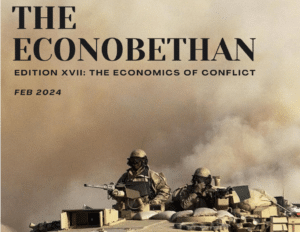 The first edition is contained within the pages of The Econobethan, the School’s well-established Economics and Politics magazine, but future editions are intended to be stand-alone publications.
The first edition is contained within the pages of The Econobethan, the School’s well-established Economics and Politics magazine, but future editions are intended to be stand-alone publications. Seyed Jalili considers how the identification of CHIP (Clonal Hematopoiesis of Indeterminate Potential) in human blood cells might translate into effective treatments. Joshua John looks at the ethical implications of genetic screening in his piece entitled The Cost of a Human Life.
Seyed Jalili considers how the identification of CHIP (Clonal Hematopoiesis of Indeterminate Potential) in human blood cells might translate into effective treatments. Joshua John looks at the ethical implications of genetic screening in his piece entitled The Cost of a Human Life.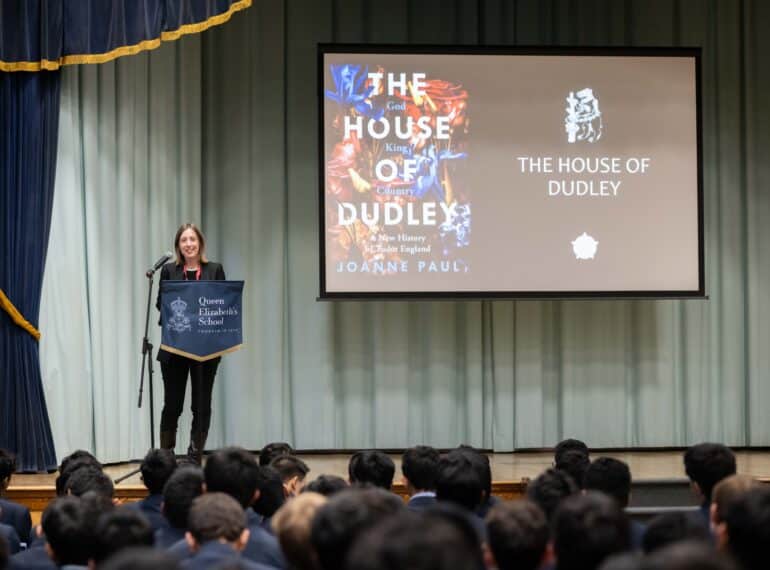
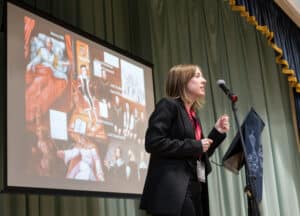 Dr Paul, author of the acclaimed 2022 book, The House of Dudley, delivered a lecture assembly to Years 8 & 9, before conducting a source-based workshop to A-level historians.
Dr Paul, author of the acclaimed 2022 book, The House of Dudley, delivered a lecture assembly to Years 8 & 9, before conducting a source-based workshop to A-level historians.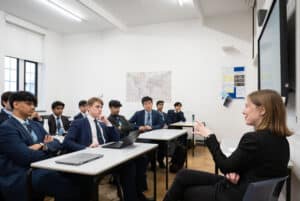 Headmaster Neil Enright said: “We are tremendously grateful to Dr Paul for giving us her time and providing these insights into the family as we wrap up our anniversary year. It seems clear that without the Dudleys, not only would Queen Elizabeth’s School not exist, but neither would the Tudors – or not as we know them, in any case.”
Headmaster Neil Enright said: “We are tremendously grateful to Dr Paul for giving us her time and providing these insights into the family as we wrap up our anniversary year. It seems clear that without the Dudleys, not only would Queen Elizabeth’s School not exist, but neither would the Tudors – or not as we know them, in any case.”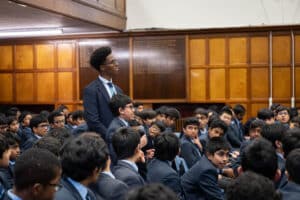 John Dudley’s success in building up the Royal Navy, as Admiral of the Fleet. He prepared it for the successes it was to enjoy in the second half of the 16th century. He added to the fleet and to the armoury, while developing Portsmouth as a great port. His military experience and leadership were important at the 1545 Battle of the Solent against the French, which, Dr Paul said, was a greater threat to England than the later Spanish Armada. John Dudley was nearly on the Mary Rose, which famously sank, but had moved across to the larger Great Harry with the king, Henry VIII.
John Dudley’s success in building up the Royal Navy, as Admiral of the Fleet. He prepared it for the successes it was to enjoy in the second half of the 16th century. He added to the fleet and to the armoury, while developing Portsmouth as a great port. His military experience and leadership were important at the 1545 Battle of the Solent against the French, which, Dr Paul said, was a greater threat to England than the later Spanish Armada. John Dudley was nearly on the Mary Rose, which famously sank, but had moved across to the larger Great Harry with the king, Henry VIII. The boys asked many questions. One wondered why so many grammar schools like QE were established under Elizabeth. Because, Dr Paul said, men such as Robert Dudley and William Cecil, her chief adviser, had received a humanist education and sought to spread that widely. Another asked why Henry VIII had had Edmund killed, given that he had brought so much money into royal coffers. She concluded that Henry probably had no personal animus against him, but that Edmund’s unpopularity made his death a good political move.
The boys asked many questions. One wondered why so many grammar schools like QE were established under Elizabeth. Because, Dr Paul said, men such as Robert Dudley and William Cecil, her chief adviser, had received a humanist education and sought to spread that widely. Another asked why Henry VIII had had Edmund killed, given that he had brought so much money into royal coffers. She concluded that Henry probably had no personal animus against him, but that Edmund’s unpopularity made his death a good political move.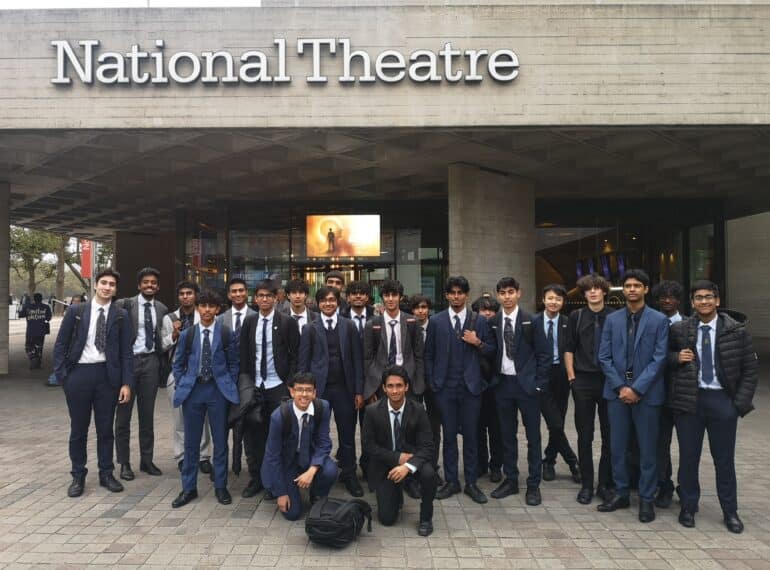
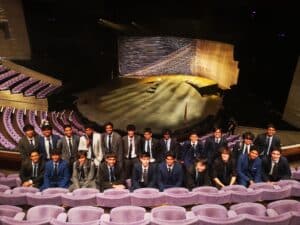 Twenty-two Year 12 boys and their teachers went on the History department trip to the National Theatre to see The Father and the Assassin.
Twenty-two Year 12 boys and their teachers went on the History department trip to the National Theatre to see The Father and the Assassin.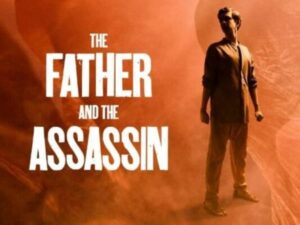 Regardless of their background, the visit enhanced all the boys’ understanding of Indian independence, showing how competing visions of a post-colonial India clashed, Mr Haswell added. They also appreciated the unique power of theatre to bring such ideas to life.
Regardless of their background, the visit enhanced all the boys’ understanding of Indian independence, showing how competing visions of a post-colonial India clashed, Mr Haswell added. They also appreciated the unique power of theatre to bring such ideas to life.